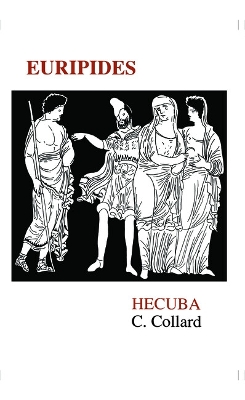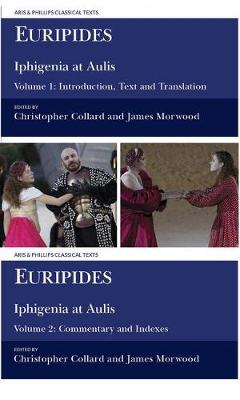Aris & Phillips Classical Texts
2 total works
Hecuba, in slavery after Troy's fall, fails to dissuade Odysseus, whose life she once saved, from sacrificing her daughter to honour his dead friend, Achilles; but the girl dies proudly, true to her royal blood in surmounting degradation. Then Hecuba learns of her sons' treacherous murder by a former ally; out of her terrible loss comes determination for revenge, which she claims as a right but how just is her horrific cruelty? How credible against her earlier characterisation? The play has striking effects: the ghost of the murdered son, and his murderer subsequently blinded; poignant lyricism; vivid narratives; above all, a careful pattern of scenes demonstrating the equivocal power of 'Persuasion, man's only sovereign' (v.816). Hecuba is both a study of resilience and weakness, and a typically Euripidean comment on the uncertain, even collapsing, values of his time. Text with facing translation, commentary and notes.
'Euripides: Iphigenia at Aulis' comprises two volumes (Volume 1: Introduction, Text and Translation; Volume 2: Commentary and Indexes), which are sold together as a set.
This is the first English edition with complete commentary of the play since 1891, and there has been only one other substantial such work in any language (W. Stockert, in German, Vienna 1992). The reasons for this remarkable lack lie chiefly in the unusual circumstances of the play's composition and early history. Euripides died before completing it and it was prepared for its first performance in or about 405 BC by his son or nephew. In the century and more after that other hands intervened, the last in very late antiquity. Since the 18th Century scholars have disagreed greatly in identifying how much of the surviving text may stem from Euripides' own hand or his original conception, and how much may be 'inauthentic'; whatever the facts, the Iphigenia has received frequent and very successful production in recent years.
The play's quality was rewarded at its first performance, with first prize in a dramatic competition. Scholars have written a stream of mostly brief general appreciations; but this edition with translation and commentary wishes to recognise that the play for the most part shows Euripides at his finest. It is therefore deliberately wide in its aim, at readers who have no Greek at all, at students in schools and universities who have some Greek, and at their teachers and professional scholars; its Introduction and the most important parts of the commentary are accessible to all, while notes particularly on the Greek of the poetic text and its problems are kept separate.
This is the first English edition with complete commentary of the play since 1891, and there has been only one other substantial such work in any language (W. Stockert, in German, Vienna 1992). The reasons for this remarkable lack lie chiefly in the unusual circumstances of the play's composition and early history. Euripides died before completing it and it was prepared for its first performance in or about 405 BC by his son or nephew. In the century and more after that other hands intervened, the last in very late antiquity. Since the 18th Century scholars have disagreed greatly in identifying how much of the surviving text may stem from Euripides' own hand or his original conception, and how much may be 'inauthentic'; whatever the facts, the Iphigenia has received frequent and very successful production in recent years.
The play's quality was rewarded at its first performance, with first prize in a dramatic competition. Scholars have written a stream of mostly brief general appreciations; but this edition with translation and commentary wishes to recognise that the play for the most part shows Euripides at his finest. It is therefore deliberately wide in its aim, at readers who have no Greek at all, at students in schools and universities who have some Greek, and at their teachers and professional scholars; its Introduction and the most important parts of the commentary are accessible to all, while notes particularly on the Greek of the poetic text and its problems are kept separate.

